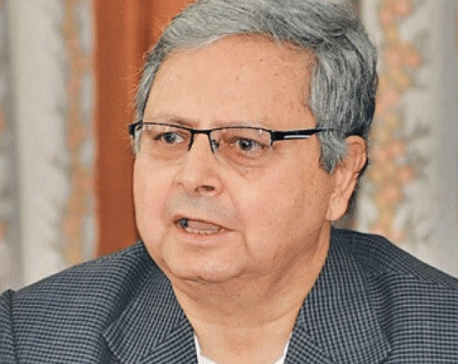
OR
Heed the voice of disabled civilian war victims: Lalitpur Declaration
Published On: February 20, 2019 04:00 AM NPT By: Republica | @RepublicaNepal
KATHMANDU, Feb 20: Following the one-year term extension of transitional justice (TJ) bodies, victims of the decade-long Maoist insurgency have demanded the government to overhaul these two bodies in terms of capabilities and performance. They have also urged the government for better support especially for the disabled civilian victims.
The Truth and Reconciliation Commission (TRC) and Commission of Investigation on Enforced Disappeared Persons (CIEDP) have got a new lease of life after their terms expired on February 9.
The National Network of Disabled Conflict Victims asked the government to ensure that the TJ bodies have clear roadmaps regarding the upcoming TJ process, necessary resources and the ability to act independently and effectively unlike during its previous terms.
The network of civilian conflict victims with disabilities organized a three-day conference in Lalitpur, which concluded on Tuesday issuing a declaration. The declaration has put forth various demands related to the wellbeing of the victims who are living with disabilities as a result of the war.
Surendra Khatri, chairman of the National Network of Disabled Conflict Victims, condemned the practice of providing compensation only to those with political connection and demanded that laws and compensation packages be made indiscriminatory.
The government has not identified the number of civilian victims who are living with disabilities. As a result, majority of them have received no compensation. Being disabled has denied them the opportunities to participate in income generating activities, forcing them to live under dire financial constraints.
“Nobody has listened to the voices of those who were rendered disabled by the war. Our voices are ignored although our plights are insurmountable,” said Surendra Khatri, chairman of the network.
He condemned the practice of providing compensation only to those with political connection and demanded that laws and compensation packages be made indiscriminatory.
“Most of the compensation packages have gone to army personnel and the combatants of the then rebel party. Why are civilian victims ignored in the process? Many years have passed but the plights of civilian victims remain unaddressed,” he added.
Along with ensuring maximum efficiency and independence of the TJ bodies, the network has also demanded amendment of laws related to justice for different types of conflict victims, including those who lost their lives, faced enforced disappearance and sexual violence among other atrocities during the war. They also demanded investigation process to be friendly and sensitive to disabled victims.
The network requested the government to address immediate and long-term needs of the disabled conflict victims.
The immediate needs of the disabled victims include free health treatment, identity cards ensuring them privilege for using public services, free education and health services for children of the disabled, environment for skill development and employment opportunities and proper data collection of those victims living with disabilities, among others.
As for the long-term needs, the demands include booking those responsible for the disabled victims' current conditions and delivering justice, providing free counseling for those who are mentally affected by the war and livelihood support allowance for the disabled victims.
You May Like This

NHRC chair accuses govt of not being serious towards resolving transitional justice process
KATHMANDU, Nov 24: Chairperson of the National Human Rights Commission Anup Raj Sharma on Sunday accused the government of not... Read More...

Way forward for transitional justice
Once again concerns are being raised from victims’ community, human rights organizations and even international community regarding the fate of... Read More...

Heal the wounds, once and for all
Parliament has endorsed the government’s proposal to extend the terms of Truth and Reconciliation Commission (TRC) and the Commission of... Read More...






Just In
- Challenges Confronting the New Coalition
- NRB introduces cautiously flexible measures to address ongoing slowdown in various economic sectors
- Forced Covid-19 cremations: is it too late for redemption?
- NRB to provide collateral-free loans to foreign employment seekers
- NEB to publish Grade 12 results next week
- Body handover begins; Relatives remain dissatisfied with insurance, compensation amount
- NC defers its plan to join Koshi govt
- NRB to review microfinance loan interest rate











Leave A Comment